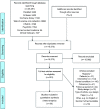Additional effects of psychological interventions on subjective and objective outcomes compared with exercise-based cardiac rehabilitation alone in patients with cardiovascular disease: A systematic review and meta-analysis
- PMID: 30857429
- PMCID: PMC6604240
- DOI: 10.1177/2047487319832393
Additional effects of psychological interventions on subjective and objective outcomes compared with exercise-based cardiac rehabilitation alone in patients with cardiovascular disease: A systematic review and meta-analysis
Abstract
Background: Exercise-based cardiac rehabilitation (ebCR) often includes various psychological interventions for lifestyle change or distress management. However, the additional benefit of specific psychological interventions on depression, anxiety, quality of life, cardiac morbidity and cardiovascular or total mortality is not well investigated.
Design: Systematic review and meta-analysis.
Methods: Randomized controlled trials and controlled cohort trials published between January 1995 and October 2017 comparing ebCR with or without pre-specified psychosocial interventions were selected and evaluated on the basis of predefined inclusion and outcome criteria.
Results: Out of 15,373 records, 20 studies were identified, including 4450 patients with coronary artery disease (88.5%) or congestive heart failure (11.5%), respectively. Studies were of low to moderate quality and methodological heterogeneity was high. As compared with ebCR alone, additional psychological interventions for lifestyle change or distress management showed a trend to reduce depressive symptoms (standardized mean difference -0.13, 95% confidence interval (CI) -0.30; 0.05). Furthermore, during a follow-up of five years, distress management was associated with a trend to reduce cardiac morbidity (risk ratio 0.74, 95% CI 0.51; 1.07). There was no evidence for an additional impact of either psychological lifestyle change interventions or distress management on anxiety, quality of life, cardiovascular or total mortality.
Conclusions: Specific psychological interventions offered during ebCR may contribute to a reduction of depressive symptoms and cardiac morbidity, but there remains considerable uncertainty under which conditions these interventions exert their optimal effects. (CRD42015025920).
Keywords: Cardiac; anxiety; depression; morbidity; mortality; psychological interventions; quality of life; rehabilitation; secondary prevention; systematic review.
Figures







Comment in
-
Effectiveness of psychological intervention as add-on to standard cardiac rehabilitation: Time to adopt new methods or keep doing more of the same?Eur J Prev Cardiol. 2019 Jul;26(10):1032-1034. doi: 10.1177/2047487319840176. Epub 2019 Mar 28. Eur J Prev Cardiol. 2019. PMID: 30922106 No abstract available.
-
The psychological component of cardiac rehabilitation drives benefits achieved.Eur J Prev Cardiol. 2022 Mar 25;29(3):e141-e142. doi: 10.1093/eurjpc/zwab040. Eur J Prev Cardiol. 2022. PMID: 33969406 No abstract available.
References
-
- Piepoli MF, Hoes AW, Agewall S, et al. 2016 European Guidelines on cardiovascular disease prevention in clinical practice: The Sixth Joint Task Force of the European Society of Cardiology and Other Societies on Cardiovascular Disease Prevention in Clinical Practice (constituted by representatives of 10 societies and by invited experts). Developed with the special contribution of the European Association for Cardiovascular Prevention & Rehabilitation (EACPR). Eur J Prev Cardiol 2016; 23: NP1–NP96. - PubMed
-
- Sharma S, Merghani A, Mont L. Exercise and the heart: The good, the bad, and the ugly. Eur Heart J 2015; 36: 1445–1453. - PubMed
-
- Lawler PR, Filion KB, Eisenberg MJ. Efficacy of exercise-based cardiac rehabilitation post myocardial infarction: A systematic review and meta-analysis of randomized controlled trials. Am Heart J 2011; 162: 571–584. - PubMed
-
- Jansen V, De Gucht V, Dusseldorp E, et al. Lifestyle modification programmes for patients with coronary heart disease: A systematic review and meta-analysis of randomized controlled trials. Eur J Prev Cardiol 2012; 20: 620–640. - PubMed
-
- Rutledge T, Redwine LS, Linke SE, et al. A meta-analysis of mental health treatments and cardiac rehabilitation for improving clinical outcomes and depression among patients with coronary heart disease. Psychosom Med 2013; 75: 335–349. - PubMed
Publication types
MeSH terms
LinkOut - more resources
Full Text Sources
Medical
Research Materials

